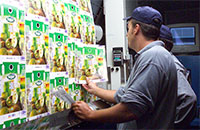7 Pillars of Food Safety for the Catering Industry
By Nick Jakubowski
Preventing food safety problems should be every caterer’s top priority as it takes only one sick customer with a social media platform to ruin a catering business. Catering and restaurant food safety procedures are very similar, but there are additional considerations like transport procedures, which must be taken into account. When you open your catering business, think about these seven pillars of food safety.
Sanitary Suppliers
Any great catering business starts with good food. Your food suppliers should already have a food safety certification process in place, something which is especially important for high risk foods. Make sure that your suppliers follow HAACP guidelines for food safety and ask about the procedures they follow. By starting with great food, that removes one piece of the contamination puzzle.
Sanitary Preparation
Preparing food for catering is no different than preparing food for any restaurant. Employees must follow standard food sanitation procedures like regular hand washing and using gloves to avoid cross-contamination. Foods thawing for transport must be kept away from raw foods and no wood must be used in the preparation of food.
Sanitary Transport
This is the tricky part for caterers. Hot and cold foods must be held at the proper temperature (Above 145 F for hot, below 40 F for cold) during transport and checked afterward to make sure they stayed there. All food must be kept in food-safe containers and stored in a location that can be sanitized. The foods which are likely to cross-contaminate should be separated from each other during transportation.
Sanitary Serving
Temperature controls must be maintained throughout the entire catering event, so it’s necessary for caterers to have the proper equipment on hand for that proper serving. Chafing dishes can keep hot foods at the right temperature. All temperatures should be checked with a probe thermometer at regular intervals. Also, all serving dishes must have their own utensils. Depending on local laws, a sneeze guard might need to be employed.
Training
All staff and volunteers must be thoroughly trained on food temperatures, safe preparation, and safe transportation. Refresher courses might be needed for those experienced within the field, as the regulations occasionally change. Make sure that ‘not knowing’ isn’t an excuse.
Full menu for Food Allergy Checking
One thing which caterers regularly encounter is food allergens. If possible, caterers must disclose the ingredients of the dish to the patrons, so that they are aware of any potential reactions. The servers also need to know what is in each dish, and if there are any known allergens which could cause a reaction.
Documentation
Finally, you will want to thoroughly document all your food safety procedures and temperature checks. These not only confirm that your employees and volunteers are following their training, but also provide a way to show a health inspector that you are following local laws if you get audited. There are several sources for catering food safety check lists that you can use as inspiration.
Following these seven pillars of food safety for the catering industry can lead to fewer complaints and less worries. Just doing it right and sticking to food safety procedures can make for a much smoother event.
About the Author
Mark Masterson is from IceMachinesPlus.com with over 10 years of experience in the restaurant and bar industry. With an extensive background and entertaining writing style, Mark is focused on providing quality information and advice to managers and contractors about the best practices on choosing the right type of ice machine.
To have more articles like this emailed to your inbox, become a GFSR Member today!

-
 FeaturedRisk management
The Cost of a Breach: What a Cyberattack Could Mean for Food Safety Recalls
FeaturedRisk management
The Cost of a Breach: What a Cyberattack Could Mean for Food Safety Recalls
-
 FeaturedRisk management
Securing the Food Chain: How ISO/IEC 27001 Strengthens Cybersecurity
FeaturedRisk management
Securing the Food Chain: How ISO/IEC 27001 Strengthens Cybersecurity
-
 FeaturedRisk management
Revolutionizing Food Safety Training: Breaking Out of the “Check-the-Box” Mentality
FeaturedRisk management
Revolutionizing Food Safety Training: Breaking Out of the “Check-the-Box” Mentality
-
 GFSI Standards
GFSI 2025: Building Trust, Tech-Forward Solutions, and Global Unity in Food Safety
GFSI Standards
GFSI 2025: Building Trust, Tech-Forward Solutions, and Global Unity in Food Safety
-
 FeaturedFood Safety
Integrated Pest Management: Strategies to Protect Your Brand’s Reputation
FeaturedFood Safety
Integrated Pest Management: Strategies to Protect Your Brand’s Reputation
-
 FeaturedFood Safety Culture & Training
No Open Door Policy: Challenges That Impact Pest Control in Food Processing Plants
FeaturedFood Safety Culture & Training
No Open Door Policy: Challenges That Impact Pest Control in Food Processing Plants


